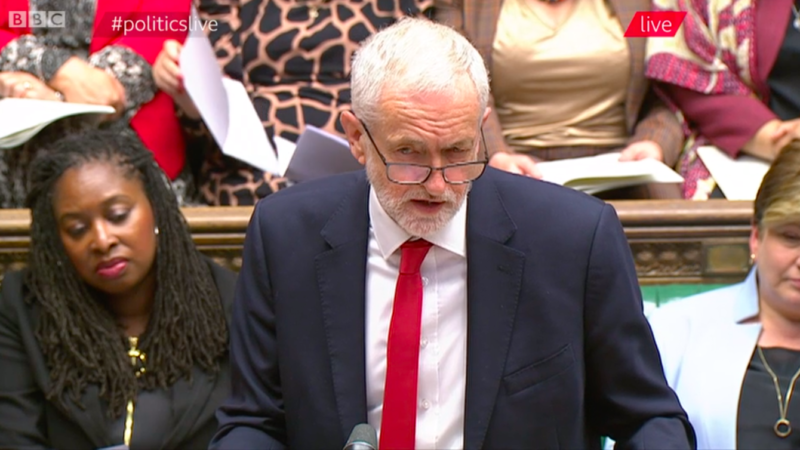
Prime Minister’s Questions is bound to be odd for some time. This week, it saw Jeremy Corbyn debate Theresa May, who has resigned as Tory leader and heads up a government full of MPs vying to replace her as Prime Minister. Her legacy has been decided – failing to deliver Brexit, exacerbating the “burning injustices” that she first railed against – and cannot change, which means nobody is interested in what she has to say or how well she performs at these weekly head-to-head sessions with the opposition leader.
Rather than a laserlike focus on a single government failure or Labour ambition, Corbyn employed more of a scattergun approach this afternoon, which never has the same level of impact. All of the questions centred on BEIS (Business, Energy and Industrial Strategy) but the links between the issues weren’t spelled out. The line of questioning didn’t elegantly flow as it did during Rebecca Long-Bailey’s turn last week.
The Labour leader began by highlighting the Conservatives’ lack of an industrial strategy and the poor state of manufacturing in the UK – though should’ve referred to Michael Fabricant’s question on this very topic a few minutes prior. Then Corbyn pressed the PM on the car industry specifically, steel and the climate change crisis. However, the main take-away was muddied when he listed other abandoned promises, from TV licenses for the over-75s to action on flammable cladding. Every one of these failures is worth pointing out, but single-issue PMQs are far more effective. Not least because the Prime Minister’s final response listing her ‘achievements’ in office otherwise seems natural and justified.
It is only on Brexit that today’s PMQs touched on what is considered immediately relevant to current political debate. Theresa May was angry about the cross-party motion led by Labour that aims to take control of the parliamentary agenda and eventually allow MPs to block no deal. As usual, the PM blamed the opposition for the increasingly likelihood of no deal, saying Corbyn went “through the lobbies regularly and consistently, voting to increase the chances of no deal by voting against the deal”. This argument didn’t work with Labour, nor her own MPs, and won’t start working now – even if a no-dealer takes charge, as expected.
But it does raise concerns for the Labour Party. Appearing on BBC’s Politics Live just before PMQs, Tory MP Bim Afolami argued that voting for a deal is the only way to actually block no deal. That is wrong. The other way is to revoke Article 50. Labour hasn’t explicitly supported that move, and Corbyn is not inclined to do so, but the natural conclusion of Labour’s current Brexit position is support for revocation. Many MPs and crucial allies such as Unite the Union will feel deeply uncomfortable and strongly oppose that stance, yet it seems inevitable that Labour will wind up there – whether that’s after campaigning for a public vote and Remain, or as a final resort to preventing no deal.




More from LabourList
‘Labour won’t stop the far right by changing leaders — only by proving what the left can deliver’
‘Cutting Welsh university funding would be economic vandalism, not reform’
Sadiq Khan signals he will stand for a fourth term as London Mayor